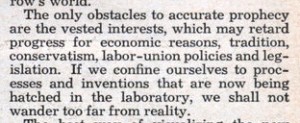Ladies in gentleman, in this seminal post, I shall speak to you not as a video entertainer but as a student of psychology, a practicioner of marketing, and a former magician (age 10). Watch in awe as I explain why our human species has trouble predicting the future, why some of my online-video foresight has been subject to such annoying external factors (not my own failures, of course), and how marketers survive. Then gaze in bewilderment as I change the subject so artfully that you conclude with a round of applause for my genius, and your keen intellect and humor for appreciating it.
As you loyal readers surely know, this blog has periodically devoted itself to predicting the future of online video (see 2006 post), and my soon-to-be-published “Beyond Viral” has a short chapter that attempts some quite risky futurspection*. It may not surprise you that it was the last chapter I wrote, the one I procrastinated the most, and the one that will surely be wrong in as many ways as it’s right.
But you and me? We’re a lot alike in that way. We are all clueless at predicting the future, even though we’re masters at looking back in time to convince ourselves otherwise. We revise history to confirm that we purposely selected the path we stumbled into quite by chance. Ask yourself about the last major change you made (change in job, relationship, geography, etc.). If it was more than a year ago, the reasons you recall justifying it are entirely different from the ones that caused it. By now your psychological white blood cells have attacked that virus of a notion, but let’s move on… Common, drop it I said. Dropppp it. Keep reading. Good boy.
There are, of course, a number of problems our species has with making predictions:
1) We can’t escape “present bias” in making predictions (a subject well explained in Dan Gilbert’s “Stumbling on Happiness“). For instance, in this 1960s futuristic view of today’s technology (video below), you’ll see that both members of the household enjoy the use of “televisions” (not monitors) and hand write communication that is sent from a “post office” in their very homes. What makes this video so humorous, of course, is that it completely overlooks the changes in gender roles. Wife is spending, and husband is busy using his multiple monitors to figure out how to pay for them. Oh, and neither have apparently adjusted their hair for the future.
I encourage you to check out Gilbert’s book if you share my interest in pursuing happiness, spiritual curiosity, amazement with psychology. I believe my next book (yes it’s time already to think about that) will be partially drawing upon Gilbert’s wisdom to provide marketers with new and entertaining ways to manipulate us transparently: let’s call it transmanipulation*. Does that sound odd? Than you haven’t seen my video about why I decided to become a marketer (click to see video about my experience with the $1.25 “flying ghost”).
Where was I? Oh- check out this video and ask yourself why it’s odd. The multiple monitors? The pen reader? The haircuts?
2) We tend to overestimate the short-term changes, and underestimate the long-term ones. (Better put by Naughton in 2008, “THE FIRST Law of Technology says we invariably overestimate the short-term impact of new technologies while underestimating their longer-term effects.” When I began imagining the future of online video in 2006, I expected online-video and television to have merged by now. But I failed to imagine far more interesting things like how we’re slowly beginning to consume more video from our smart phones, and about how television and online video continue to co-exist.
The big stuff creeps up on us like the frog in water that gets slowly hotter (legend has it that he’d jump out immediately if it was boiling to begin with). If you haven’t heard this analogy before, or investigated the flaws in it, then you really need to spend more time with some marketers.
3) Vested interests retard progress. This quote, from a wonderful 1950s article in Popular Mechanics predicting 2000, explains this challenge well. When I imagined integrated online-video and television, I underestimated how the economic interest by cable providers would delay what is readily available. Although ANYONE with moderate income can enjoy online video from their HDTV, few do. That’s because most of us are so lazy or uninformed that we default to the box that Comcast or Verizon sell or rent us. Then we laugh about how our grandmother is still renting a rotary phone from Mah Bell.

Yes, friends, today’s technology is not entirely driven by possibilities and your preferences and demand. You’ll get what the economy rewards, even if that means you’ll buy your iPhone and iPad and give up Flash. And you’ll switch from one telecommunications provider with great coverage and low prices to another… because your emotional desire for beautiful and prestigious gadgets overrides your logic. Sorry, folks. The brain is the rabbit in the “hare versus turtle” tale. Bet on the heart.
Wait this time I switched subjects by accident not on purpose. But just out of curiosity, did you click the word “retard” in this section’s title?
4) We selectively recall predictions we and others called accurately (and ignore or forget the ones that were wrong unless they were wonderfully and profoundly wrong). This inarguable psychological nuance is the basis for a booming industry of futurists and psychics. Even their victims help their cause, like many Notradamus faithfuls do when selectively interpreting his predictions. But before you feel too proud to be above that, consider why you might visit a psychic… then later recall just a few of the things he/she predicted quite accurately. You know the Pied Piper is manipulating you, but dang that pipe plays a mesmorizingly* attractive tune.
While in 2006 I predicted fairly well the consolidation of online-video sites and the evolution of a network aggregation model (Hulu), I also thought some online-video stars would become television and film stars. Whoops- failed to appreciate that the television/film economy still mostly under estimates or snubs “weblebrities,” and that many have gained more income and larger audiences by NOT being plucked from web obscurity and graced with attention from talent agencies, representatives and producers. I’m also seeing more clearly that what makes a web star (talent, self sufficiency, persistence, social networking, interaction with audience, thick skin, diversity of skills) is quite different from what makes a television or film star (good looks, acting chops, Hollywood network, good timing, the right gene pool, ass kissing).
And of course sometimes I like predicting things unlikely just to generate some controversy or get people to think.
So why, you ask, am I reflecting on the “problems of predicting the future of online video” (or any crystal ball gazing)? You didn’t ask that, but I made you think you did.
Well its’ pretty simple. I’m using this post as an exercise in addressing cognitive dissonance with public use of rationalization, ego defense and misdirection. But now you think you saw that all along, right? In 2006 I predicted “marketers will get smarter” about online video. And although financial predictions suggest 2011 the space will flourish, I failed big time on that account. As a career marketer, I should have known one thing with certainty. We marketers will not get smarter in a year, or even a dozen years. We’re an impressive group with lots of sizzle, but smarter? So naive I can be.
We marketers lack the balls to sell or the intellect to create something. But we’re psychological masters of that odd space between creating (Beta tapes were good) and selling (VHS tapes were adopted), so we market!

And you’ll watch with amazement at our brilliance! Stand with mouths agape as we’re targeting important segments, generating unique consumer insights, identifying real and perceived value propositions, engaging and converting prospects, articulating benefits not features, and (of course) executing flawlessly. Yes you’ll watch our show like first-grade children enjoying their first magic show. Some will see our slight of hands, but all will leave with astonishment and wonder.
(Insert applause here)
* I made us the words in asterisks, and I hereby trademark them (c) Kevin Nalty 2010.
